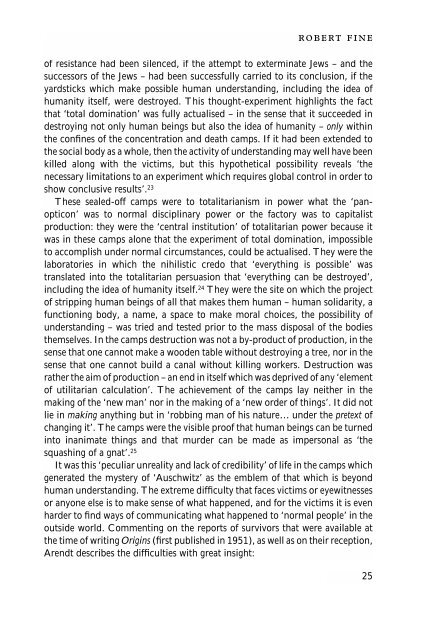You also want an ePaper? Increase the reach of your titles
YUMPU automatically turns print PDFs into web optimized ePapers that Google loves.
obert fine<br />
of resistance had been silenced, if <strong>the</strong> attempt to exterminate Jews – and <strong>the</strong><br />
successors of <strong>the</strong> Jews – had been successfully carried to its conclusion, if <strong>the</strong><br />
yardsticks which make possible human understanding, including <strong>the</strong> idea of<br />
humanity itself, were destroyed. This thought-experiment highlights <strong>the</strong> fact<br />
that ‘total domination’ was fully actualised – in <strong>the</strong> sense that it succeeded in<br />
destroying not only human beings but also <strong>the</strong> idea of humanity – only within<br />
<strong>the</strong> confines of <strong>the</strong> concentration and death camps. If it had been extended to<br />
<strong>the</strong> social body as a whole, <strong>the</strong>n <strong>the</strong> activity of understanding may well have been<br />
killed along with <strong>the</strong> victims, but this hypo<strong>the</strong>tical possibility reveals ‘<strong>the</strong><br />
necessary limitations to an experiment which requires global control in order to<br />
show conclusive results’. 23<br />
These sealed-off camps were to totalitarianism in power what <strong>the</strong> ‘panopticon’<br />
was to normal disciplinary power or <strong>the</strong> factory was to capitalist<br />
production: <strong>the</strong>y were <strong>the</strong> ‘central institution’ of totalitarian power because it<br />
was in <strong>the</strong>se camps alone that <strong>the</strong> experiment of total domination, impossible<br />
to accomplish under normal circumstances, could be actualised. They were <strong>the</strong><br />
laboratories in which <strong>the</strong> nihilistic credo that ‘everything is possible’ was<br />
translated into <strong>the</strong> totalitarian persuasion that ‘everything can be destroyed’,<br />
including <strong>the</strong> idea of humanity itself. 24 They were <strong>the</strong> site on which <strong>the</strong> project<br />
of stripping human beings of all that makes <strong>the</strong>m human – human solidarity, a<br />
functioning body, a name, a space to make moral choices, <strong>the</strong> possibility of<br />
understanding – was tried and tested prior to <strong>the</strong> mass disposal of <strong>the</strong> bodies<br />
<strong>the</strong>mselves. In <strong>the</strong> camps destruction was not a by-product of production, in <strong>the</strong><br />
sense that one cannot make a wooden table without destroying a tree, nor in <strong>the</strong><br />
sense that one cannot build a canal without killing workers. Destruction was<br />
ra<strong>the</strong>r <strong>the</strong> aim of production – an end in itself which was deprived of any ‘element<br />
of utilitarian calculation’. The achievement of <strong>the</strong> camps lay nei<strong>the</strong>r in <strong>the</strong><br />
making of <strong>the</strong> ‘new man’ nor in <strong>the</strong> making of a ‘new order of things’. It did not<br />
lie in making anything but in ‘robbing man of his nature… under <strong>the</strong> pretext of<br />
changing it’. The camps were <strong>the</strong> visible proof that human beings can be turned<br />
into inanimate things and that murder can be made as impersonal as ‘<strong>the</strong><br />
squashing of a gnat’. 25<br />
It was this ‘peculiar unreality and lack of credibility’ of life in <strong>the</strong> camps which<br />
generated <strong>the</strong> mystery of ‘Auschwitz’ as <strong>the</strong> emblem of that which is beyond<br />
human understanding. The extreme difficulty that faces victims or eyewitnesses<br />
or anyone else is to make sense of what happened, and for <strong>the</strong> victims it is even<br />
harder to find ways of communicating what happened to ‘normal people’ in <strong>the</strong><br />
outside world. Commenting on <strong>the</strong> reports of survivors that were available at<br />
<strong>the</strong> time of writing Origins (first published in 1951), as well as on <strong>the</strong>ir reception,<br />
Arendt describes <strong>the</strong> difficulties with great insight:<br />
25

















